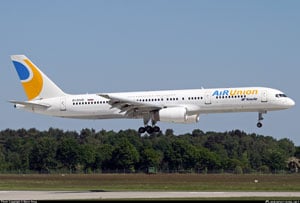
Every business has its risks. But most businesses don’t risk getting an airplane seized by a foreign country.
That’s what happened to International Lease Finance Corp. The Century City company lost a Boeing 757 to Russian customs officials after the airline that leased the plane ceased operations. Because of what it claims was a customs paperwork error, ILFC can’t get its jetliner back.
Research suggests that used 757s sell for about $10 million, although ILFC is battling its insurance company for $21 million.
The episode is an example of the danger businesses face when dealing with small companies in countries with murky legal systems – though losing an airplane is remarkable even in that world.
“It definitely illustrates at least the occasional peril of doing business outside U.S. and Western European jurisdictions, along with a few others,” said George Hamlin, president of Hamlin Transportation Consulting in Fairfax, Va. Nevertheless, he added, “this case tends a little more to the extreme.”
ILFC operates somewhat like an auto dealership, except it leases airplanes instead of cars. The lost-plane episode began in 2006 when ILFC leased five midsize planes to KrasAir, an airline in Krasnoyarsk, Russia, that was a member of Russian airline alliance Airunion.
Less than two years after the ILFC lease deal, KrasAir removed the engines from one of the planes and shipped them to China for repair.
That’s when Moscow customs officials lost track of the engines, recording the wrong serial numbers and mislabeling the parts as “waste,” ILFC claims.
Meanwhile, KrasAir had taken on so much debt that suppliers refused to give the airline any more fuel, which grounded the company.
KrasAir began bankruptcy proceedings in 2008 and the ILFC lease was canceled. The plane in question couldn’t fly without engines and the Russians aren’t cooperating due to the paperwork error.
It is not unusual for small airlines to go out of business, and leasing companies such as ILFC and its rivals – which include another Century City company, Air Lease Corp.; Irish company Fly Leasing Ltd.; Dutch firm AerCap Holdings N.V.; and General Electric Co.’s leasing arm GE Capital Aviation Services – are adept at repossessing their planes.
It’s possible that a plane could get lost – but nevertheless it’s a rare occurrence, said Rick Phillips, a managing director at Irvine aerospace and defense investment banking firm Janes Capital Partners.
“One of the assumptions behind aircraft leasing is that you’re going to have to be able to take control of the assets when you need to,” he said.
That assumption becomes less reliable when doing business in countries where regulatory, legal and business practices can be convoluted.
“Who knows who understands Russian bankruptcy laws?” Phillips said.
Insurance issue
But because air travel is growing in developing economies, aircraft leasing companies are willing to take on some of the risk of doing business with them. The Russian airline market is expected to increase to 94 million annual passengers by 2016, a 44 percent increase from 2011, according to the International Air Transport Association in Geneva. But in Russia, the aviation industry remains in the early stages of developing a functioning regulatory system.
“They’re evolving a structure of dealing with this, but apparently it’s not complete,” said consultant Hamlin.
The other problem is insurance. ILFC’s insurer has refused to cover the loss. In a pair of lawsuits filed last month, ILFC is suing the company for at least $21 million.
XL London Market Ltd., in London, the lead underwriter named in the case, declined to comment. ILFC, in the suit filed last month with California Superior Court in Los Angeles, said that XL and other underwriters claimed their insurance policy does not cover commercial customs disputes. ILFC contends that is not true.
“ILFC is disappointed that XL refuses to acknowledge its obligations under our contract of insurance and we will pursue all avenues open to us to enforce such obligations,” said Paul Thibeau, a spokesman for ILFC, who declined to comment further.
ILFC, a fully owned subsidiary of American International Group Inc., owns and manages about 1,000 aircraft and leases them to about 200 airlines in 80 countries. Its founder, Steven Udvar-Hazy, who was No. 11 on the Business Journal’s list of Wealthiest Angelenos last year, sold it to AIG in 1990 and left in 2010 to form rival Air Lease Corp.
ILFC filed to go public in 2011 but pulled back because of market conditions. A Chinese group of investors has agreed to buy a 90 percent stake in ILFC worth $4.75 billion in a deal subject to approval by U.S. and Chinese regulators.
The uncertainty about control of its assets could make any company uneasy about leasing to customers in unproven markets.
“If you can’t exert rule of law, I guess you just hope for the best,” said Robert Mann, president of airline consultancy R.W. Mann & Co. in Port Washington, N.Y. “A lot of leasing companies won’t do business in these places.”
ILFC’s problem could make leasing companies reconsider doing business with Russian airlines.
“Different companies have different appetites for risk,” said Hamlin. “If Russian carriers want to lease aircraft and no one will lease to them, they may want to fix this problem.”
